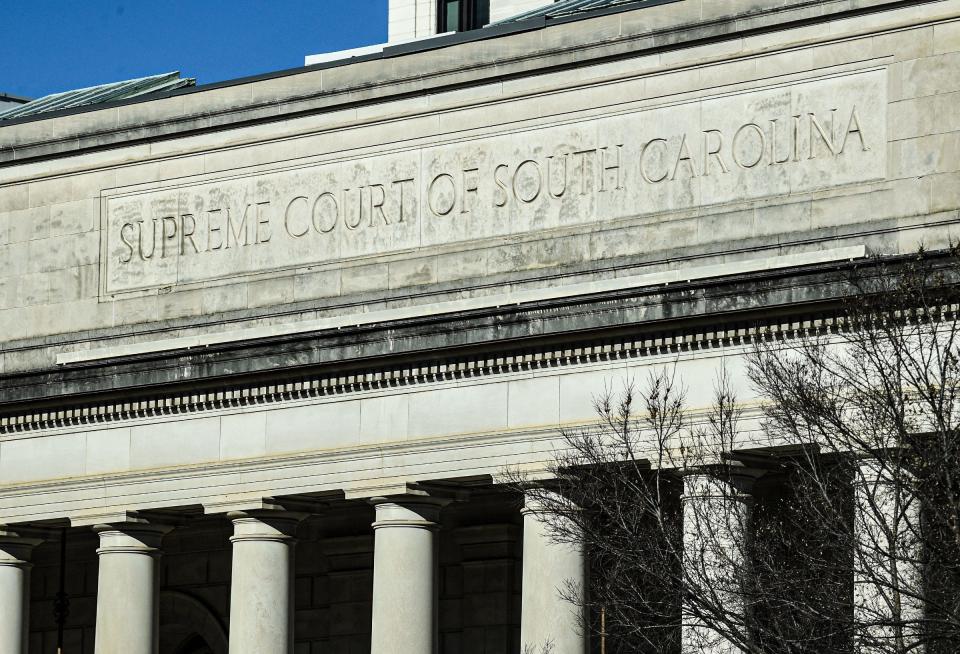SC Supreme Court remands death penalty order, calls for discovery into lethal injection
The South Carolina Supreme Court remanded a trial judge's order challenging the constitutionality of the state's firing squad and electrocution execution methods on Thursday, requesting further discovery into the South Carolina Department of Correction's efforts to obtain drugs for lethal injection.
The circuit court now has 60 days to oversee the discovery process then another 60 days to hold any hearing into the determination as to the availability of lethal injection in the state, according to the order.
The Supreme Court will hold any further decision on the constitutionality of the state’s other execution methods until discovery into lethal injection is complete.
More:SC Supreme Court to decide legality of electric chair, firing squad
"We will hold the remainder of the appeal in abeyance pending the circuit court's resolution of the discovery issue," the court order read.
The order comes a few weeks after the Supreme Court heard oral arguments to appeal trial judge Jocelyn Newman’s order that determined the state’s firing squad and electrocution methods as unconstitutional.
During the trial challenging the methods last year, Newman granted a protective order during the pretrial phase that barred attorneys defending four condemned men on death row from inquiring about SCDC’s efforts into obtaining drugs for lethal injection during the discovery process.
Attorneys representing the state cited a state statute that prohibits disclosing the identity of anyone on an execution team and argued the constitutionality of lethal injection wasn’t being challenged.
Dig deeper:Here are the issues and debates that will mold South Carolina politics in 2023
However, the Supreme Court found the denial an abuse of discretion and reversed the protection order allowing attorneys representing the inmates to inquire further about the procurement of drugs.
Legislation signed by Gov. Henry McMaster in 2021 made electrocution the default method of execution in the state. However, the revised statute also provided alternatives stating “or, at the election of the convicted person, by firing squad or lethal injection, if it is available at the time of election.”
But what “available” means remains unclear.
“On the current record, it is impossible to know exactly what steps the State has taken to procure the drugs for lethal injection and to evaluate the State's assessment that such drugs are not 'available' in South Carolina,” the Supreme Court’s order read.

The Supreme Court also wrote that counsel for the state could not articulate exactly what efforts have occurred and that even if good faith attempts have been made to obtain the drugs, they can’t rely simply on arguments.
“The arguments of counsel are not evidence, and this information should be passed upon by the circuit court in the first instance because that court is the proper fact-finder in this matter,” the order read.
The Supreme Court’s decision comes a day after McMaster urged the state legislature to pass a shield law that would protect the identity of manufacturers looking to sell lethal injection drugs to South Carolina during his State of the State Address.
“Ladies and gentlemen, we cannot keep waiting,” McMaster said. “We must give these grieving families and loved ones the justice and closure they are owed by law and tell the people of South Carolina that their government believes in the rule of law - just like they do.”
More:South Carolina revisits shield law as Supreme Court debates firing squad, electrocution
SCDC has struggled to obtain the drugs since 2013 when the department’s remaining supplies expired.
Senator Greg Hembree, R-North Myrtle Beach, prefiled a bill ahead of the current legislative session that would expand the state’s current ban on revealing the identities of members of an execution team to include the identities of persons “who participate in the planning or administration of an execution death.”
The bill goes further than just protecting the identities of drug suppliers. It also seeks “to provide the out-of-state acquisition of drugs intended for use for the administration of the death penalty are exempt from all state licensing processes and requirements administered by the department of health and environmental control (DHEC) or any other agency, as well as regulations promulgated by the Board of Pharmacy.”
According to DHEC, persons or entities that manufacture, distribute, or dispense controlled substances in South Carolina are required to obtain a South Carolina controlled substances registration from the department.
Pentobarbital, a sedative, is the only drug in SCDC’s current lethal injection protocol that is considered a controlled substance, according to a spokesperson from DHEC.
Lesia Shannon Kudelka, communications director with the SC Department of Labor, Licensing and Regulation, told The Greenville News that any entity wishing to ship prescription drugs or devices to the state needs a non-resident permit. However, Kudelka said nothing South Carolina Pharmacy Practice Act prohibits a state-licensed pharmacist from compounding the medications themselves.
On Jan. 19, it was voted favorably out of the subcommittee for Corrections and Penology 3-1 and will move to the full committee in the next couple of weeks.
This article originally appeared on Greenville News: SC Supreme Court remands death penalty order

